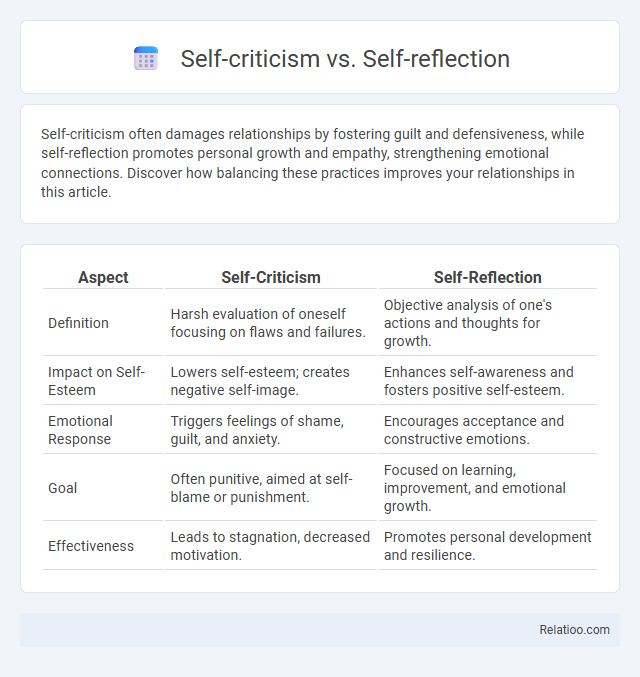Self-criticism often damages relationships by fostering guilt and defensiveness, while self-reflection promotes personal growth and empathy, strengthening emotional connections. Discover how balancing these practices improves your relationships in this article.
Table of Comparison
| Aspect | Self-Criticism | Self-Reflection |
|---|---|---|
| Definition | Harsh evaluation of oneself focusing on flaws and failures. | Objective analysis of one's actions and thoughts for growth. |
| Impact on Self-Esteem | Lowers self-esteem; creates negative self-image. | Enhances self-awareness and fosters positive self-esteem. |
| Emotional Response | Triggers feelings of shame, guilt, and anxiety. | Encourages acceptance and constructive emotions. |
| Goal | Often punitive, aimed at self-blame or punishment. | Focused on learning, improvement, and emotional growth. |
| Effectiveness | Leads to stagnation, decreased motivation. | Promotes personal development and resilience. |
Understanding Self-Criticism: Definition and Origins
Self-criticism involves harsh judgment and negative evaluation of one's actions and qualities, often rooted in perfectionism and early life experiences. It contrasts with self-reflection, which is a constructive process of examining thoughts and behaviors to foster growth and learning. Understanding self-criticism requires exploring its psychological origins, including cognitive biases and internalized voices from caregivers or societal expectations.
What Is Self-Reflection? Key Concepts Explained
Self-reflection is the intentional process of examining your thoughts, feelings, and actions to gain deeper understanding and personal growth, distinguishing it from self-criticism which often involves negative judgment. This practice encourages mindful awareness and learning from experiences, fostering emotional intelligence and resilience. By engaging in self-reflection, you can develop clearer insights into your behavior patterns and make more conscious decisions moving forward.
The Psychological Impact of Self-Criticism
Self-criticism involves harshly judging oneself and is closely linked to increased levels of anxiety, depression, and low self-esteem, worsening mental health outcomes. In contrast, self-reflection promotes a balanced and constructive examination of one's thoughts and behaviors, fostering personal growth and emotional resilience. Understanding the psychological impact of self-criticism highlights its role in perpetuating negative cognitive patterns, which can be mitigated by adopting self-reflective practices that encourage self-compassion and adaptive coping strategies.
Benefits of Practicing Self-Reflection
Practicing self-reflection enhances emotional intelligence by fostering greater self-awareness and clarity about personal motivations and behaviors. This mindful process supports mental well-being, reduces stress, and encourages constructive change without the harshness associated with self-criticism. Research shows that individuals who engage in regular self-reflection demonstrate improved decision-making and resilience, distinguishing this approach from the often negative and counterproductive patterns found in self-criticism.
Self-Criticism vs Self-Reflection: Core Differences
Self-criticism involves harsh judgment and negative evaluation of one's actions or qualities, often leading to decreased self-esteem and motivation. Self-reflection, by contrast, is a constructive and objective process of examining one's thoughts and behaviors to foster growth and self-awareness. Core differences include self-criticism's focus on fault-finding and blame versus self-reflection's emphasis on learning and improvement.
How Self-Criticism Affects Mental Health
Self-criticism often leads to increased stress, anxiety, and depression by fostering negative thought patterns that undermine your self-esteem and resilience. Unlike self-reflection, which promotes personal growth through objective analysis and learning from experiences, self-criticism tends to magnify failures and reinforce feelings of inadequacy. Managing self-criticism through mindful practices can significantly improve mental health and emotional well-being.
Building a Habit of Healthy Self-Reflection
Building a habit of healthy self-reflection involves cultivating a balanced mindset that avoids harsh self-criticism while encouraging honest evaluation of personal actions and thoughts. Unlike self-criticism, which often leads to negative emotions and decreased motivation, self-reflection fosters self-awareness and growth by objectively assessing experiences and learning from them. Incorporating consistent practices such as journaling or mindfulness can enhance emotional intelligence and promote sustained personal development.
Transforming Self-Criticism into Constructive Reflection
Self-criticism often involves harsh judgment that undermines self-esteem and stifles growth, whereas self-reflection fosters insight and personal development by objectively evaluating experiences and behaviors. Transforming self-criticism into constructive reflection requires shifting the internal dialogue from blame to curiosity, focusing on learning and improvement rather than punishment. Utilizing techniques like mindfulness and cognitive restructuring enhances this transformation, enabling a balanced self-assessment that supports emotional resilience and adaptive change.
Practical Tools for Shifting from Criticism to Reflection
Self-criticism often triggers negative emotions that hinder growth, whereas self-reflection fosters awareness and constructive insight. Practical tools for shifting from criticism to reflection include journaling to track thought patterns, mindfulness techniques to observe without judgment, and asking open-ended questions that promote understanding rather than blame. By incorporating these strategies, you can transform self-critical tendencies into opportunities for personal development and emotional resilience.
Embracing Growth: Cultivating Self-Compassion
Self-criticism often hinders personal growth by fostering negative judgment, while self-reflection encourages understanding and learning from experiences. Embracing growth requires cultivating self-compassion, allowing you to acknowledge mistakes without harshness and to nurture resilience. Prioritizing self-reflection over self-criticism empowers your development and well-being.

Infographic: Self-criticism vs Self-reflection
 relatioo.com
relatioo.com